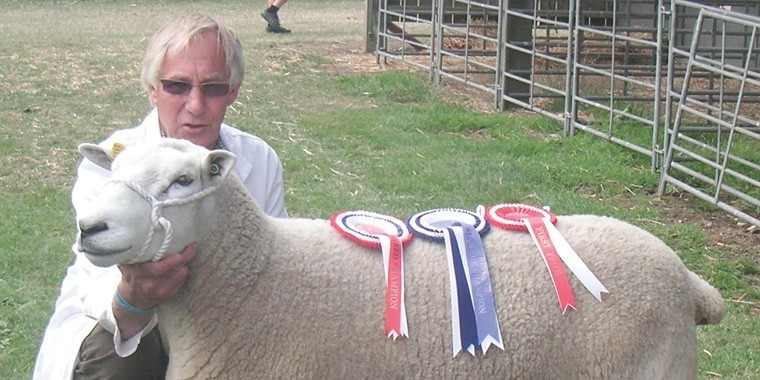Well now in mid-February and we have still made no significant progress in the seemingly interminable and improbable (if not impossible) task of achieving some sort of resolution to the negotiations that will steer our eventual exit from the EU. The majority of UK sheep producers are now in the uncomfortable position of approaching lambing with absolutely no knowledge or understanding of what sort of market they will be selling their lambs into in the coming season.
Lamb trade is always a little volatile, never certain nor predictable, just look at the events of 2018, but at least in the past we have been assured of some sort of functional market, even this, however, cannot be assumed for 2109.
We often like to regard farming and our sheep very much as a way of life, a rather romantic notion, but, ultimately what we do is produce food (in our case a delicious and greatly underappreciated product that we call lamb (but which should also include hogget and mutton)), sadly however we reside within a society that has a general expectation of cheap food; something that consumers have enjoyed for a long time. In reality the relative cost of food has decreased significantly over the past three decades or so.
In the 1980’s the average consumer spent 15%+ of their disposable income on food. That figure has declined to about 8%, but I would suggest that even then, people will generally consume more (some significantly more) and better food than in the past.
It has been support for agriculture, in various facades that has driven this process. Support for farmers has essentially been a taxpayer subsidy to consumers, and without support, food prices would inevitably have risen to prevent a dramatic (even greater than we have seen) drop in our level of self-sufficiency and the decimation of the UK agricultural sector.
Unfortunately cheap food has become an integral part of successive governments’ policies, regardless of their complexion, and it will be a very brave government that oversees any significant rise in consumer food prices to the level required to provide a fair return to producers (and I do mean fair. Simply an adequate reward for the time and resources invested in production). Cheap food has also become the tool of choice for our large food retailers (i.e. the supermarkets) as they have competed to increase market share, something that governments have been happy to encourage, hence the lack of any effective supermarket code of (fair) practice to introduce a little evenhandedness in the way they deal with suppliers. Increasing food prices are a huge driver of inflation and a driver that has an immediate impact. Consumers are, generally, acutely aware of any variation in their weekly food spend; So where do we go now?
All the indicators are that the government support for farmers, as farmers, will either go or be severely curtailed. Government will not want food price inflation, no supermarket wants to see unilateral rises in prices which may damage competitiveness, so will seek alternative supplies if there is any significant upward pressure on UK supply costs.
What can we do about it? As farmers we are insignificant, at about 1.5% of the working population, even if we all worked together (something farmers are not very good at doing), is anybody really going to listen to us? But, consider what we contribute to the economy as a whole. It’s around about 10-12% of the national economy that is dependent on agriculture either up stream, machinery manufacturers, feed mills etc or downstream, food processors, hauliers, food retailers etc. So we are key to a significant portion of the economy.
Useless Eustice, seems to think that we will be OK if we have a hard Brexit, suggesting that the fall in the value of Sterling will offset any tariffs on our exports to the remainder of the EU. Fine if you simply consider the headline tariff rate (WTO) at 12.8% on sheep carcasses. Sterling devaluation could easily reach or exceed this but, what about the fixed rate payment of €171.3 (£150.4) per 100kg, an effective tariff rate of 48%?
This leads us to a range of conclusions… Either the government is expecting a devastating drop in the value of the pound, Mr Eustice simply does not understand the WTO, or maybe he is just telling lies. The chances of our European ex-partners not imposing tariffs, are very low. Until we have properly negotiated trade agreements with the EU such a move would not be permitted under WTO rules, unless of course the EU do the same for all other WTO members; the chances of that? Zero.
There will be the “ostriches” who will simply pretend that everything will carry on as normal, a possibility if we merely cancel “Article 50” and return to the status quo, an option but a remote possibility. Most sheep producers will be readying themselves for change, but what change?
Consider all of the options:
- Knowing where you are at the moment is key (this may seem obvious, but how many producers know what price they need to cover production costs?)
- Have a rough idea of how your business will need to react in the face of a range of outcomes.
- Prepare for the worst and hope for the best, it’s a bit like lambing time really; although if we have used raddles, scanned and got our feeding and management about right we have a significantly better understanding and knowledge of our likely outcome at lambing.
Good luck with lambing and fingers crossed for some sort of outcome, hopefully successful, but at least some direction, on Brexit.




